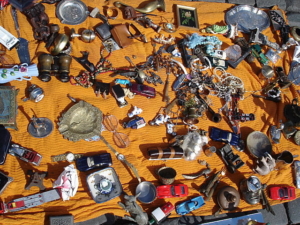 Poetic interludes taken from Andrei Voznesensky’s “Marche aux Puces”
Poetic interludes taken from Andrei Voznesensky’s “Marche aux Puces”
To treat a twee topic with real nuance is no easy thing. It requires bypassing the overwhelmingly precious exterior, opening this cute carapace and getting at the interior components, not just with a probing finger, but with the right tool, held in the knowledgeable hands.
In my time as a teenager, like many of the same age living on the North American continent, I would wander those halls of consumerism: the local mall. Older, wiser, but still largely aimless, without much in the way of disposable currency, I’ve traded out the commodity petting zoo for its component meat market — the second-hand store and the flea market.
These are venues of nostalgia, certainly quite hip. The acceleration of time’s passing is a narrative for this technological era, and it screams out from archaic glassware, obsolete audio storage mediums, and the most delightfully unfashionable of fashions. These are things that once were common items in people’s lives, people whose lives could very well have ended, and these are the shadows of those things that they could not take with them to the immaterial afterlife. This reasonably priced pathos is precious. The thrift store reeks of Shelley, and other open-shirted hipsters digging through people’s refuse as a way of putting together their own life.
If things had souls you’d be their fingerprints!
Temples of junk, Fleamarket!
Your clutter makes a small lost tune
My Muse waltzes to.
But this is where we crack that cover, and start digging through the mechanisms. What interests me in thrift stores is those technological elements that don’t simply signify change, but are that evolution itself — the cast off computers, stereo components, audio/visual elements from long departed elementary schools, the gadgets that were never needed and yet sold and bought regardless, what once was shiny and new but now is dusty and decrepit I’ve put together quite a number of usable computers from these parts, either for my own use or for donation to places with use for such old machines. I’ve assembled functional devices with different purposes entirely than those to which their parts were originally component. The Shelley I admire is the the other half of the famous couple: the Shelley who built a monster. I look at each consumerist tragedy as if it were a parts list, rather than an approach to sincerity by way of a font of irony.
Sell me, little cast-offs,
I’m obsolete as you!
When Robot Ten comes off the line
There’s no use for One or Nine.
This is my own conceit, of course. I feel that by trading in use-value, I’m more legitimate of a scavenger. I am still a romantic, just with notions more in line with Frankenstein’s perversions than Ozymandias’ historical authority. Automaton gods, both — created in the image of an ideal. One of functional monstrosity, the other of cultural majesty. And what is either, in the face of the rest of society’s productions? Still marooned on an ice floe, or buried in sand. I act as if I sort through these remains with a greater purpose than someone recycling style. But really, I’m just another rag picker with a specialty. I’m a consumer without much money, who has found his particular place in the vast conspiracy of demand and supply.
What if a crudely programmed
Archangel
made of nuts and bolts
Rasps to me: “You’re through!”
Then, Fleamarket, take me in,
I’ll slip into a corner like an out-of-fashion jacket.
I’m obsolete!
-like a rocket-launching pad
Excavated in the desert!
These metaphorical curios are not particularly notable in and of themselves. They are just a reminder of the futility of being human. The real technicality to the process of interacting with our meaningful objects is its vast complexity. There is no single narrative of creation and collapse throughout the extent of the thrift store. There are thousands of stories, and they involve not simply the two-dimensional axes of consumerist cost and profit, but the rocket science of all our life’s trajectories and emotional propellants, parabolas of war and invention, milestones of ingenuity through the layered atmospheres of everyday life. Successes, failures, and inevitably, the meandering path to obsolescence — these are the stories of our stories. Nothing found in a thrift store is as simple as a chipped teacup. Every item is evidence of aliens building the pyramids. And the aliens, the robots, the gods, the teacups, are us.
This post may contain affiliate links.








